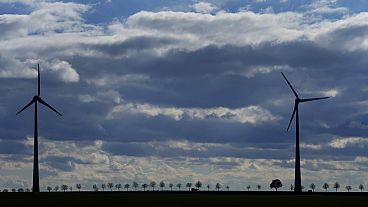Annual meat production emissions are roughly equivalent to those from every car, truck and plane in the world, according to Greenpeace.
Climate impact labels could persuade people to choose more climate-friendly foods, a study has found.
Providing information about the environmental impact of foods is an effective method of altering consumer choices, the clinical trial by researchers from Johns Hopkins and Harvard universities concluded.
It comes after an Intergovernmental Panel on Climate Change (IPCC) report in April that urged country leaders to encourage people to choose less carbon-heavy diets.
It placed particular emphasis on meat consumption, especially red meat like beef and pork.
Should we be eating less red meat?
Industrial meat is the single biggest cause of deforestation globally and is responsible for annual emissions roughly equivalent to those from every car, truck and plane in the world, according to Greenpeace.
“Animal-based food production, primarily driven by beef production, is responsible for 14.5 per cent of global greenhouse gas emissions and is an important modifiable contributor to climate change,” say the authors of the clinical trial.
Policymakers in the UK and across the world have been discussing how to persuade people to consume less of the carbon-heavy product.
In England, around 85 per cent of agricultural land is given over to grazing pastures for animals like cows or used to grow feed for livestock.
Greenpeace says a 70 per cent reduction in meat production is necessary for the land to be used sustainably.
Can ‘climate impact’ labelling change food habits?
One trial has looked at whether ‘environmental impact’ labels on food can persuade consumers to choose more climate-friendly products.
The report, published in the journal Jama Network Open, found that people changed their food choices after reading about their environmental impacts.
The study, conducted by researchers from Johns Hopkins and Harvard universities, asked a group of 5,049 adults in the US to order items from a fast food menu.
The participants were shown menus with one of three labels: a quick response code label on all items (control group); a green low-climate impact label on chicken, fish or vegetarian items (positive framing); or a red high-climate impact label on red meat items (negative framing).
The labels on the low-climate impact menu stated, “This item is environmentally sustainable. It has low greenhouse gas emissions and a low contribution to climate change.”
The high-climate impact menu read: “This item is not environmentally sustainable. It has high greenhouse gas emissions and a high contribution to climate change.”
When shown the high-climate impact menu, 23.5 per cent more participants chose a sustainable item compared to the control group.
In the group given the low-climate impact menu, 9.9 per cent more participants opted for a sustainable choice.
Is white meat bad for the environment?
While the clinical trial labelled chicken and fish as sustainable food choices, studies have shown they can also negatively impact the environment.
Intensively produced chicken has been found to pollute rivers while producing soya to feed the animals destroys vast areas of forest.
Farmed and trawled fish is also not necessarily a sustainable option as it can damage marine habitats.



